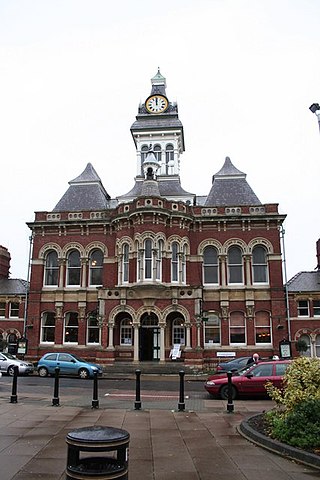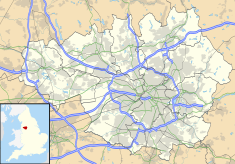
Tameside is a metropolitan borough of Greater Manchester, England, named after the River Tame, which flows through it, and includes the towns of Ashton-under-Lyne, Audenshaw, Denton, Droylsden, Dukinfield, Hyde, Mossley and Stalybridge. Tameside is bordered by the metropolitan boroughs of Stockport to the south, Oldham to the north and northeast, Manchester to the west, and to the east by the Borough of High Peak in Derbyshire. As of 2022, the population of Tameside was 232,753, making it the 8th-most populous borough of Greater Manchester.

Stalybridge is a town in Tameside, Greater Manchester, England, with a population of 23,731 at the 2011 Census.

Mottram in Longdendale is a village in Tameside, Greater Manchester, England. At the 2011 census, the population for the ward of Longdendale, which includes Mottram and the surrounding area, was 9,950.

Sheffield Town Hall is a municipal building on Pinstone Street in the City of Sheffield, England. The building is used by Sheffield City Council, and also contains a publicly displayed collection of silverware. It is a Grade I listed building.

Hyde is a town in Tameside, Greater Manchester, England, which had a population of 35,890 in 2021. Within the boundaries of the historic county of Cheshire, it is 5 miles (8 km) north-east of Stockport, 6 miles (10 km) west of Glossop and 6.5 miles (10 km) east of Manchester.

Mossley (/ˈmɒzli/) is a town and civil parish in Tameside, Greater Manchester, England. It is located in the upper Tame Valley and the foothills of the Pennines, 3 miles (4.8 km) south-east of Oldham and 9 miles (14.5 km) east of Manchester. In 2011 it had a population of 10,921.

Rochdale Town Hall is a Victorian-era municipal building in Rochdale, Greater Manchester, England. It is "widely recognised as being one of the finest municipal buildings in the country", and is recorded in the National Heritage List for England as a designated Grade I listed building.

Cowbridge Town Hall is a public building in the High Street of Cowbridge in South Wales. The town hall, which is the meeting place for Cowbridge with Llanblethian Town Council, and also houses the town clerk's office, the committee rooms and the Cowbridge Museum, is a Grade II* listed building.

Croydon Town Hall is a council building in Katharine Street, Croydon which serves as the headquarters for Croydon London Borough Council. It is a Grade II listed building.

The Old Town Hall, Richmond, on Whittaker Avenue in Richmond, London, is a former municipal building which from 1893 to 1965 served as the town hall for the Municipal Borough of Richmond.

Ealing Town Hall is a municipal building in New Broadway, Ealing, London, England. It is a Grade II listed building.

Grantham Guildhall is a municipal building on St Peter's Hill, Grantham, Lincolnshire, England. It is a Grade II listed building.

Scarborough Town Hall, originally St Nicholas House, is a red brick Jacobean Revival mansion in Scarborough, North Yorkshire, England, currently used as a municipal building for the Borough of Scarborough and an events venue. It was built in the 19th century as a home for John Woodall, a prominent local businessman, and then converted and extended for municipal use in 1903. Situated overlooking the South Bay, it is a grade II listed building.

Wakefield Town Hall is a municipal building in Wood Street in Wakefield, West Yorkshire, England. It remains a venue for weddings and civil partnerships but is no longer the headquarters of Wakefield Council which is now based at County Hall. The town hall is a Grade I listed building.

Thornaby Town Hall is a municipal building in the Mandale Road in Thornaby-on-Tees, North Yorkshire, England. The building, which is owned by Thornaby Town Council, is a Grade II listed building.

Dukinfield Town Hall is a municipal building in King Street, Dukinfield, Greater Manchester, England. The town hall, which was the headquarters of Dukinfield Borough Council, is a grade II listed building.

Colne Town Hall is a municipal building in Albert Road, Colne, Lancashire, England. The town hall, which is the meeting place of Colne Town Council, is a grade II listed building.

Worthing Town Hall, or New Town Hall, is a municipal building in Chapel Road, Worthing, West Sussex, England. The town hall, which is a meeting place of Worthing Borough Council, is a Grade II listed building. Located at Chapel Road in the centre of Worthing, it was opened in 1933 and built in a neo-Georgian style to designs by Charles Cowles-Voysey. Containing offices and a Council chamber it replaced Worthing's Old Town Hall as the administrative centre, a building that had been the home of Worthing's local authority from 1835 and was demolished in 1966. To the rear and west lies the Assembly Hall, built in 1935, also to designs by Cowles-Voysey. To the south lies the Worthing Museum and Art Gallery, originally built as a Carnegie Library.

Altrincham Town Hall is a municipal building in Market Street, Altrincham, Greater Manchester, England. The town hall was the headquarters of Altrincham Borough Council.

Stalybridge Town Hall was a municipal building in Stamford Street, Stalybridge, Greater Manchester, England. The building, which was the meeting place of Stalybridge Borough Council, was a Grade II listed building.

























